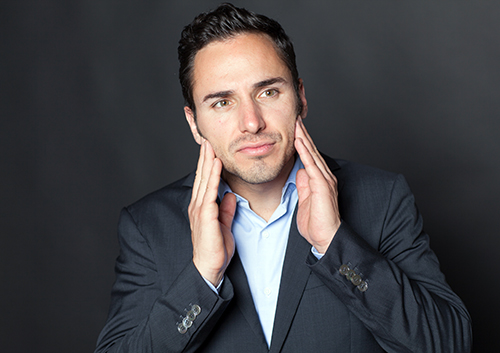May 13th, 2015

According to the Centers for Disease Control and Prevention, 38% of the adult population in the United States did not visit a dentist in 2013. Of that 38 percent, 21 percent cited “fear” as the cause.
With the innovative, state-of-the-art Wand STA (Single Tooth Anesthesia), patients do not have to fear going to the dentist anymore. The Wand STA eliminates the pain of the local anesthetics that are injected with a syringe into the gums to numb the mouth during the dental procedure.
The majority of people who have encountered a bad experience at the dentist say it is because of the injection to numb the area of the mouth that will be worked on. What you may not realize is that the pricking of the skin is about as painful as a paper cut. More often than not, the discomfort comes from the rapid flow of the local anesthetic.
The Wand STA is a computer controlled injection. The computer controls the rate of which the local anesthetic flows. The faster the local anesthetic injection flows, the more uncomfortable or painful the injection is. The computer slows the flow of the injection, guaranteeing minimal to no pain for you.
What does treatment with the Wand STA involve?
- The actual hand piece that provides the local anesthetic looks like a pen.
- The STA delivery system looks similar to a small shaped computer.
- A cartridge that contains the local anesthetic sits on top of the computer unit. A tube is connected to the pen that has a very small needle inside.
- The system has two modes: the first one is the regular wand that has three different speeds for injecting the local anesthetic. This mode is used when more than one tooth is being treated. The second mode is the single tooth mode, used to numb just one tooth and prevent the cheek, lips, and entire side of the mouth from becoming numb.
We’re proud to use the Wand STA at our Raleigh, NC office. It’s a simple but important tool that allows Dr. Gregory Weaver to help you to maintain excellent oral health.
May 6th, 2015

The merry month of May also happens to be National Fitness and Sports Month, so take advantage of the warmer days to get outside and exercise! Bringing a friend, family member, or coworker with you when you go for a brisk walk during a lunch break can provide an opportunity to socialize as well as health benefits. If you need a little more motivation, here are some good reasons to stay active and fit.
Exercise provides:
- Improved stamina and energy as well as toned muscles and bone strength and density
- Improved circulation and breathing for a healthier heart and lungs
- Reduced risk for Type 2 diabetes and certain forms of cancer
- For older adults, regular exercise may help improve balance and reduce the risk of falls as well as improved cognitive abilities
Children and Teens
Children and teenagers spend long hours at their desks in school, on the computer, watching television, and involved in other sedentary activities that result in obesity and poor health later in life. Getting them engaged in school or community sports teams can help them form good life-long exercise habits. One important note: If they are participating in contact sports, Dr. Gregory Weaver and our team at Weaver Dentistry recommend your kids wear an approved mouthguard to protect those valuable teeth from injury! Ask us for a proper fitting of your safety appliance during your next visit!
A gym membership is nice but not necessary to stay fit; try these easy ways to work some exercise into your daily routine.
At Home
- Take a friend along for company on a walk through your neighborhood.
- Pursue gardening or other yard work, including mowing or raking.
- Take your kids on a bike ride or have them push a baby stroller around the block.
Couch potatoes take note: simply moving from the sofa to the floor for some sit-ups, leg-lifts, or push-ups while you’re watching television can help you get in better shape in no time.
At Work
- Take the stairs instead of the elevator.
- Take exercise breaks for walks around the building or parking lot.
- Walk or ride a bike to work.
So what are you waiting for? Get moving!
For more information on exercise techniques, or to schedule an appointment with Dr. Gregory Weaver, please give us a call at our convenient Raleigh, NC office!
April 29th, 2015

Patients who suffer with Temporomandibular Disorders, popularly referred to as TMD, now have the option of receiving TruDenta Therapy. This advanced system combines laser therapy along with electrical stimulation in an ongoing process that takes place conveniently in our Raleigh, NC office.
Stress or injury to the Temporomandibular Joint or TMJ which is located in the jaw directly in front of the ear is what causes patients to suffer with this painful disorder. Although some patients have spurts of pain that eases up after a few weeks, this has been known to be an ongoing problem for many patients and can cause severe headaches.
Advantages of Treatment
- Dr. Gregory Weaver will be able to help heal your TMD pain free, with no needles or drugs
- No migraines
- Increased ability to sleep
- No more teeth grinding
- Muscles soreness recedes
Contact our Raleigh, NC office today to find out if TruDenta can help you ease your headaches and muscle tension in your jaws. You will be simply amazed at the difference you will feel with such a simple procedure and what it can do to help you improve your overall health.
April 22nd, 2015

During the early days of the environmental awareness movement, those who demonstrated against pollution, toxic chemicals, and the general public health were known as hippies. The early 1970s were a time of change, and assertions that we needed to pay more attention to the Earth's atmosphere were generally dismissed. But within a couple decades, it had become clear that the previous generation was right; the citizens of the world needed to become more environmentally conscious.
Many people feel that they can't make a difference if they don't do something big. But caring for the environment doesn't have to be an all-or-nothing concept. In fact, the little things you do can add up to make a great impact, especially in our community. Here are a few ways you can help the environment on Earth Day, April 22nd and all year around.
Four Small Ways to be Environmentally Friendly
- Recycle Your Textiles. Nearly 21 million tons of textiles are added to American landfills each year, according to the Environmental Protection Agency. Donating your unwanted clothing to a secondhand store or an organization that repurposes fabric helps cut down on solid waste and conserves natural resources.
- Reduce Usage of Disposables. Plastic bottles and bags, disposable diapers and other things we can use and toss out are convenient, but they're not necessary. Simply choosing to replace one of type of disposable with a reusable product can help you cut down on waste that has a large negative impact on our environment.
- Conserve Water. If everyone in the United States turned off the water while brushing their teeth, more than 1.5 million gallons of water could be conserved. Turn the water on long enough to wet your toothbrush for brushing and rinsing, and then immediately turn the water off again.
- Turn Off the Lights. Flip the light switch to "Off" if you're going to leave a particular room for 15 minutes or more. This will conserve energy on incandescent light bulbs and cut down on cooling costs.
It's not necessary to be an activist or install solar panels all over your home to help the environment. Although you can do these things, the little everyday measures make a big difference in helping to conserve energy and the environment, while reducing your carbon footprint. Our team at Weaver Dentistry wants to remind you to celebrate Earth Day and help the environment, knowing that it will benefit your and your children's generation.




